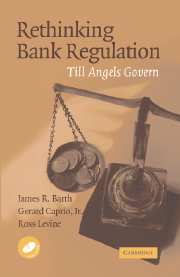Book contents
- Frontmatter
- Contents
- List of Figures, Tables, and Appendices
- Preface
- Rethinking Bank Regulation
- 1 Introduction
- 2 Contrasting Approaches to Bank Regulation
- 3 How Are Banks Regulated and Supervised Around the World?
- 4 What Works Best?
- 5 Choosing Bank Regulations
- 6 Rethinking Bank Regulation
- Appendices
- References
- Index
6 - Rethinking Bank Regulation
Published online by Cambridge University Press: 06 July 2010
- Frontmatter
- Contents
- List of Figures, Tables, and Appendices
- Preface
- Rethinking Bank Regulation
- 1 Introduction
- 2 Contrasting Approaches to Bank Regulation
- 3 How Are Banks Regulated and Supervised Around the World?
- 4 What Works Best?
- 5 Choosing Bank Regulations
- 6 Rethinking Bank Regulation
- Appendices
- References
- Index
Summary
“I cannot expect to have escaped statistical errors and oversights, although I hope that none of them is serious enough to affect descriptions or conclusions substantially. All I can do is to take comfort in the proverb, ‘Nothing ventured, nothing gained,’ and to put my faith in those who will plow the field over again and may produce a richer harvest, in particular obtaining a higher yield per hour for their labor.”
Goldsmith (1969, p. x)APPROACH AND CONTEXT
Joseph Schumpeter (1912, p. 74) argued that the banker authorizes the entrepreneur, in the name of society, to innovate. He meant that banks mobilize society's savings and decide who gets to use them. If banks make good decisions, this will maximize the chances that the economy will innovate and thrive. Thus, bank regulation and supervision matter. As illustrated by the differences between the United States and Mexico during the nineteenth century, banking policies can either underwrite growth that benefits society at large, or they can fortify a political fortress that simultaneously enriches the elite while thwarting the aspirations of the many.
To contribute to the understanding of bank regulation and its impact on societies, we construct a new database on banking policies around the world. Within international policy circles, official regulators and supervisors have relied on their experience to formulate best practice recommendations. Clearly, practical experience is essential for designing sound policies.
- Type
- Chapter
- Information
- Rethinking Bank RegulationTill Angels Govern, pp. 307 - 316Publisher: Cambridge University PressPrint publication year: 2005
- 12
- Cited by



